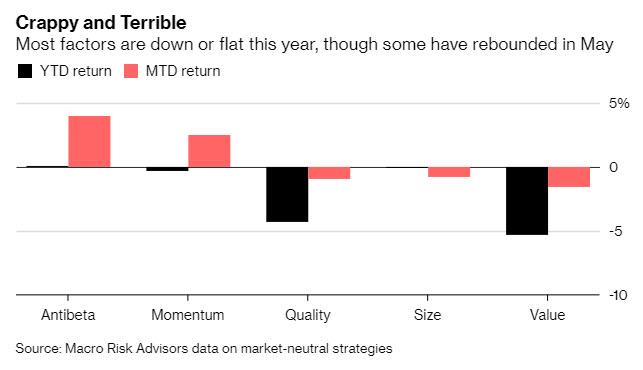It’s not just humans who have no idea how to trade this market: math PhD’s are just as clueless, and as a result quants are having a deja vu of December when they suffered jarring losses in a short period of time, just like their human peers.
For evidence, look no further than HBK Capital Management, which is closing its quant unit, adding to the recent pile up of hedge funds that wagered on algorithmic trading… poorly.
According to Bloomberg, the Dallas-based firm which manages a total of $8 billion, is liquidating a more than $400 million quant fund and returning capital to investors, based on a statement Friday. HBK is also cutting its allocation to a statistical arb fund. The quant strategy was one of seven that HBK employed, alongside corporate credit, emerging markets, event-driven equities, structured credit, developed markets fixed income and volatility.
“HBK’s decision was prompted by a reevaluation of its equity statistical arbitrage effort, which performed exceptionally well through 2014 but less well in recent periods,” according to the statement from the $10 billion firm. “Although recent performance compared favorably with many similar funds, it did not meet HBK’s return objectives.”
HBK is the latest fund to fall amid hard times, struggling to make money amid bouts of market volatility. Investors yanked $8 billion from quant funds in the first four months of this year, according to data from eVestment. That’s on top of the $19 billion they pulled in 2018.
Even iconic investors such as billionaire Cliff Asness who manages one of the world’s largest funds, has faced losses and redemptions, admitting earlier this month that quant stock selection has been “terrible.” Amplitude Capital, which lost money for two straight years and saw investor withdrawals, is returning outside money. And BlueMountain Capital Management is liquidating its $1 billion computer-driven portfolio and refocusing on human-run investing.
One of the main reasons for the quant underperformance: the nature of stock gyrations. As Bloomberg explained, risk appetite and economic growth expectations haven’t been strong enough to help revive a factor like value, which tends to be made up of cheaper and thus riskier equities. Others, like quality and low-volatility, have looked out of tune with the new year rally, even after they became expensive thanks to their haven appeal in late 2018.
Even the momentum factor, which had made money in eight of the last 10 years, plunged in 2019. The strategy of buying winners of the past year and selling its losers became loaded with more defensive bets in the fourth quarter, and they turned into laggards as the S&P 500 surged in the new year.
Despite the challenging conditions and his colorful remarks, Asness told the Morningstar conference in Chicago he intends “to stick like grim death” to his beliefs and work on improving his explanations to help investors.
Proponents argue that recent factor underperformance is statistically nothing out of the ordinary and needs to be considered in the long term. If and when portfolios rebound, these declines might seem like a blip in retrospect. Asness reckons stock valuations are currently stretched to levels not seen since the 1990s tech bubble — a signal that his strategies may be ready to pay off.
However as of mid May, and especially later into the month, the headache is that factor declines have been occurring in concert. Sanford C. Bernstein noted earlier this year that rising correlations in the field, which reached the highest in at least two decades, have made it harder for quants to generate idiosyncratic returns and stave off unwanted risks.
For instance, both value and momentum — two factors that in the past have moved in opposite directions — have dropped together in the last two quarters.
Yet one man’s meat is another man’s poison, because as many in the business are throwing in the towel on quant strategies, Steve Cohen’s Point72 Asset Management is expanding its quant business with two money manager hires. Specifically, according to Bloomberg, Sergey Fein joined this week from ExodusPoint Capital Management, while Yang Lu, who previously worked at BlueMountain Capital Management. Both will be portfolio managers in the firm’s Cubist Systematic Strategies unit.
Fein joins after a little more than a year at ExodusPoint, which was co-founded in 2018 by Michael Gelband and was the biggest ever hedge fund launch. Fein previously co-founded quant fund R&F Capital Advisors, which shuttered in 2017 amid a slump for systematic strategies.
Lu was most recently at BlueMountain, where he co-ran the firm’s systematic hedge fund with Perry Vais. BlueMountain is liquidating its roughly $1 billion systematic portfolio to focus on human-run credit investing.
Point72, which now manages $13.5 billion and which has served as the basis for the show Billions on various occasions, “has seen its share of managers come and go as multistrategy hedge funds compete for talent.” The firm is seeking to raise an additional $1 billion this year after garnering $5 billion in outside capital when it launched in 2018. The fund has returned 7.4% in the first four months of 2019.
via ZeroHedge News http://bit.ly/2IfXX6X Tyler Durden
